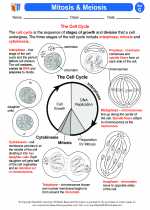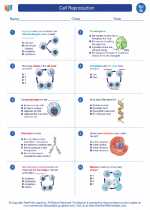Cooperation in Science
Cooperation is the process of working together to achieve a common goal. In science, cooperation is essential for conducting experiments, gathering data, and solving complex problems. It allows scientists to share ideas, resources, and expertise to advance our understanding of the natural world.
Why Cooperation is Important in Science
- Allows for the sharing of knowledge and ideas
- Enables pooling of resources and expertise
- Fosters a collaborative environment for problem-solving
- Leads to more comprehensive and reliable scientific results
Examples of Cooperation in Science
1. International research collaborations
2. Multi-disciplinary studies involving researchers from different fields
3. Sharing of data and resources among scientific institutions
4. Team-based experiments and projects
Study Guide
Here are some key points to remember about cooperation in science:
- Define cooperation in the context of science.
- Explain why cooperation is important for scientific research.
- Provide examples of cooperation in scientific endeavors.
- Discuss the benefits of cooperation for advancing scientific knowledge.
Additional Resources:
- The importance of cooperation in science - Nature
- Cooperation and collaboration in scientific research - ScienceDaily
◂Science Worksheets and Study Guides Seventh Grade. Cell Reproduction
Study Guide Cell Reproduction
Cell Reproduction  Activity Lesson
Activity Lesson Mitosis & Meiosis
Mitosis & Meiosis  Worksheet/Answer key
Worksheet/Answer key Cell Reproduction
Cell Reproduction  Worksheet/Answer key
Worksheet/Answer key Cell Reproduction
Cell Reproduction  Worksheet/Answer key
Worksheet/Answer key Cell Reproduction
Cell Reproduction  Vocabulary/Answer key
Vocabulary/Answer key Cell Reproduction
Cell Reproduction  Vocabulary/Answer key
Vocabulary/Answer key Cell Reproduction
Cell Reproduction  Vocabulary/Answer key
Vocabulary/Answer key Cell Reproduction
Cell Reproduction  Vocabulary/Answer key
Vocabulary/Answer key Cell Reproduction
Cell Reproduction  Vocabulary/Answer key
Vocabulary/Answer key Cell Reproduction
Cell Reproduction  Vocabulary/Answer key
Vocabulary/Answer key Cell Reproduction
Cell Reproduction  Vocabulary/Answer key
Vocabulary/Answer key Cell Reproduction
Cell Reproduction  Vocabulary/Answer key
Vocabulary/Answer key Cell Reproduction
Cell Reproduction 

 Activity Lesson
Activity Lesson
 Worksheet/Answer key
Worksheet/Answer key
 Worksheet/Answer key
Worksheet/Answer key
 Worksheet/Answer key
Worksheet/Answer key
 Vocabulary/Answer key
Vocabulary/Answer key
 Vocabulary/Answer key
Vocabulary/Answer key
 Vocabulary/Answer key
Vocabulary/Answer key
 Vocabulary/Answer key
Vocabulary/Answer key
 Vocabulary/Answer key
Vocabulary/Answer key
 Vocabulary/Answer key
Vocabulary/Answer key
 Vocabulary/Answer key
Vocabulary/Answer key
 Vocabulary/Answer key
Vocabulary/Answer key

The resources above cover the following skills:
LIFE SCIENCE
From Molecules to Organisms: Structures and Processes
Gather and synthesize information to explain how prokaryotic and eukaryotic cells differ in structure and function, including the methods of asexual and sexual reproduction.